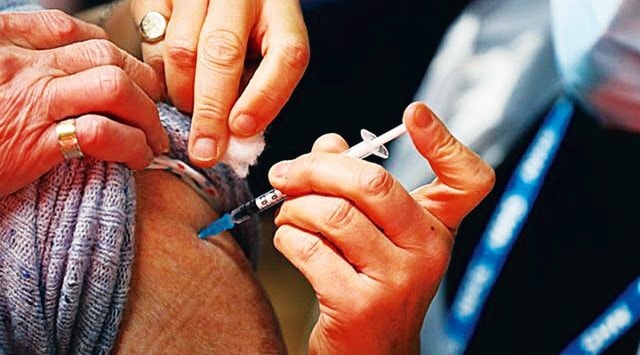- India
- International
The second dose—myths and realities
It’s important to receive the second shot of the anti-COVID vaccine. It’s timing though is still a work in progress
 The new data from the UK, the country of origin of the Oxford AstraZeneca vaccine, now suggests that the dosage interval of 12 weeks is preferable for Covishield.
The new data from the UK, the country of origin of the Oxford AstraZeneca vaccine, now suggests that the dosage interval of 12 weeks is preferable for Covishield.Written By Upendra Kaul and Meera Shah
It is a remarkable feat that within a year of the outbreak of the COVID-19 pandemic, we have vaccines against the virus. However, unlike many vaccines known to us, these have to be given twice in quick succession. Several issues need to be understood. Why two doses? Are two doses enough to increase immunity sufficiently? What is the best time of getting the second dose administered and is a booster dose required after the second dose?
A few weeks after vaccines were initially tested, the first dose gave rise to a relatively low level of immunity as judged by the antibody titres in the blood. The next set of trials looked at giving two doses of the vaccine and it was found that immunity was substantially strengthened after the second dose, and these vaccines were found to be highly effective in preventing infections that cause the symptoms. This led to the second dose becoming part of the protocol. The subsequent trials, therefore, started to look at the immunity conferred after the second dose of vaccine which was administered three to four weeks after the first dose. However, as all these later trials had already decided to administer two doses right from the outset, it is hard to determine how much immunity was conferred by the first dose alone.
The production of the vaccine in sufficient amounts is a challenge especially when millions of people have to be vaccinated in a short period. A case can, therefore, be made for delaying the second dose till most of the population has received the first dose. But an argument in favour of two vaccines is that people who get just one dose may have only partial immunity to Covid-19 infection and vulnerability to potential vaccine-resistant variants. However, these questions cannot be answered unless proper trials are conducted on the impact of the first dose of any new vaccine.
In a recent announcement from Johnson and Johnson, a single dose adenovirus-based vaccine has completed its Phase Three Ensemble Clinical Trial. It has demonstrated 66 per cent efficacy in protecting 43,783 participants from moderate and severe COVID-19 infection up to 28 days after vaccination. The data is yet to appear in a peer-reviewed journal. Meanwhile, they are also studying the two-dose strategy to compete with the two-dose regimen.

In India, the adenovirus-based vaccine Covaxin, from Bharat Biotech is currently in Phase Three of the clinical trial, but has been launched prematurely. The data is still awaited regarding its efficacy, whether two doses are required or what the gap should be between the two doses.
The information on the timing of the second dose is based largely on the Pfizer and Moderna mRNA-based vaccines which are not available in India (due to cost and difficult storage requirements) and the Oxford AstraZeneca’s vaccine, Covishield. For the mRNA-based vaccines, the Centres for Disease Control and Prevention of the USA has recommended that the second dose be given within three to four weeks of the first dose. Under no circumstances is the second dose of this vaccine supposed to be delayed beyond six weeks. The data regarding the Oxford AstraZeneca vaccine, being bulk manufactured by Serum Institute of India at Pune, recommends that the second dose be given after four weeks. This is the protocol being followed in our country presently. More than 10 million healthcare professionals and frontline workers have received the shots. But the pace of vaccination is not adequate to meet the target of 300 million people by August 2021.
The new data from the UK, the country of origin of the Oxford AstraZeneca vaccine, now suggests that the dosage interval of 12 weeks is preferable for Covishield. The researchers found vaccine efficacy reached 82.4 per cent after a second dose in those with a dosing interval of 12 weeks or more. If the two doses were given less than six weeks apart, the efficacy was only 54.9 per cent. A single dose of vaccine provided 76 per cent protection overall against symptomatic Covid-19, but how long this protection might last with a single dose is not understood.
This additional data has come from trials involving 17,177 participants in Brazil, South Africa and the UK. The analyses suggest that it is the dosing interval and not the dosing level that has the greatest impact on the efficacy of the vaccine. This is in line with previous research supporting greater efficacy with longer intervals with vaccines such as for influenza and Ebola. If we take all this evidence together, the 12-week gap between the first and second dose seems to be a better strategy as more people can be protected quickly and the ultimate protective effect is greater.
Some people who have received the Covid-19 vaccination reported illnesses after the first shot, usually fever, chills, body aches, malaise, swelling of face and soreness at the site of the shot. These symptoms are transient and not life-threatening and subside by taking common medicines like paracetamol. More people have reported that the second shot can also be followed by symptoms. These common symptoms are signs that the vaccine has triggered an immune response, which it is supposed to do. Such symptoms are usually over a very short-term — in any case, it’s much better than being sick with COVID-19.
The data suggests that the new variants seem to increase the ability of COVID-19 to spread but without any change in the degree of sickness. The current vaccines appear to work against the new variants. When vaccines are created, they are designed to create different antibodies to various components of the virus. That means even if one part of the virus mutates, the antibodies may recognise another part of the virus. There may be a variant that reduces vaccine efficacy but researchers and the companies that make vaccines are constantly creating modifications that are likely to work against new strains of Covid-19. Whether they will actually work or not needs yet to be tested and firmly established.
For any new vaccine, whether two doses will be required or a single dose is adequate can only be answered by proper longer-term trials conducted on the impact of its first dose. Equally, for all vaccines, whether a booster dose would be needed at a later stage even after 2 doses can only be determined by a longer follow up and research.
It is very important to remember that vaccines increase the immunity to face the infection but do not in any way prevent the transmission of the virus. There will, therefore, be very few asymptomatic infections that are far less infectious than symptomatic ones. Therefore, the hygiene measures for prevention need to continue for quite some time to come.
We are fortunate to have effective vaccines against COVID-19. At present all the vaccines need two doses one after the other. The success rates after the second dose are high enough to eradicate the virus. The timing of the second dose is still evolving and recommendations are likely to change for Covishield to 12 weeks or more from the present four weeks. We should not be shy of getting vaccinated twice against this very infectious virus.
Upendra Kaul is a well-known cardiologist recipient; Meera Shah works in Public Health.
EXPRESS OPINION
More Explained
Apr 26: Latest News
- 01
- 02
- 03
- 04
- 05











































